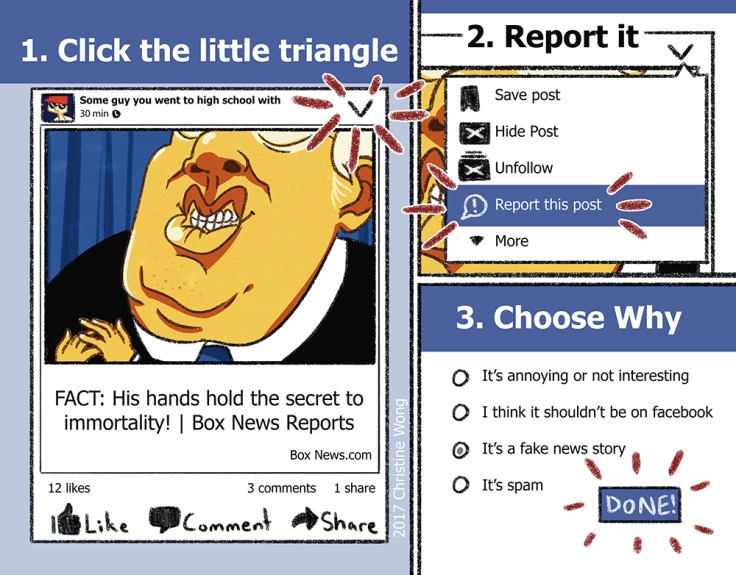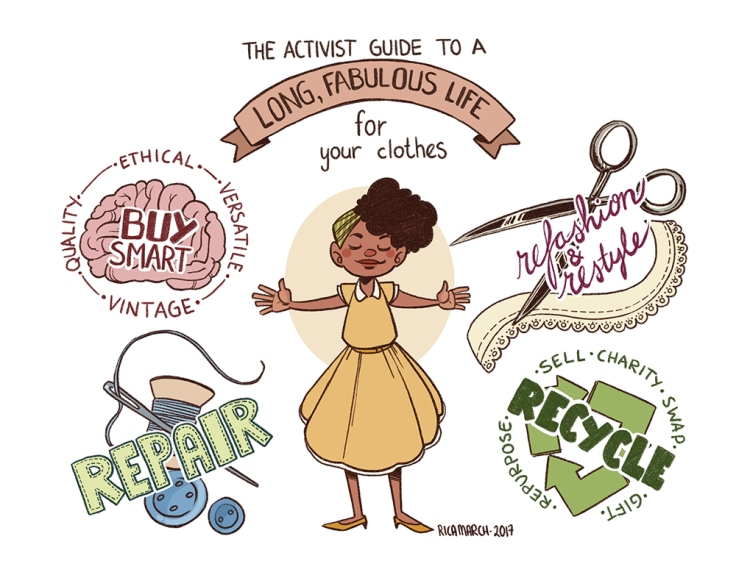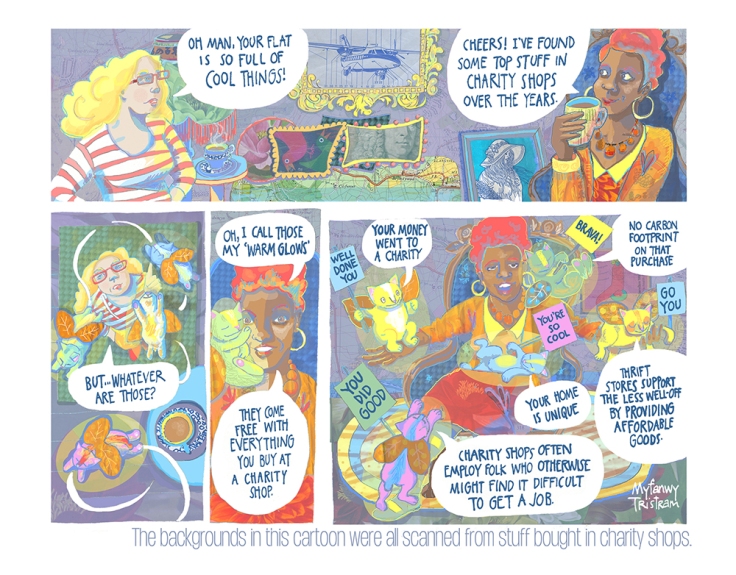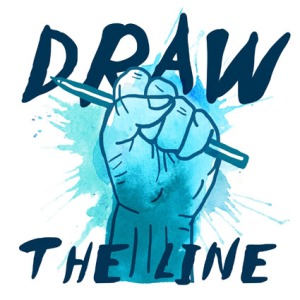Grandiose actions are all well and good, but sometimes it’s the tiny things, repeated over and over, that make a real difference.
Here are some to try.
Click any of the images to see them at a larger size.

CHECK FACTS
Facts are a better weapon than insults, that’s for sure.
In a ‘post-truth’ world, let’s hold onto the importance of veracity. In the UK you can use FullFact.org, and in the US, Politifact, and there are numerous projects worldwide with the same mission: remaining politically neutral while simply researching and presenting the facts behind news stories.
Image by David Blumenstein

BORE ON
It can be dispiriting, always being the wet blanket who points out that buying certain foods or frequenting certain businesses is supporting unethical practices.. but peer pressure is a remarkably powerful tool.
Keep it up, and soon they’ll be the ones reminding you!
Image by H-P Lehkonen

SHOP LOCAL
Using local businesses is one of the most pleasant political actions there is.
You get your goods (often with exemplary customer service) and the warm glow of satisfaction that comes from knowing that your money is going directly into the local community.
Image by Lucy Knisley

BE WHO YOU ARE
…and allow others to be who they are.
BlackLivesMatter say ‘be unapologetically black’.
The same can apply across all ways of being. Be who you are, unapologetically. And help others do the same.
Image by Steven Appleby

LISTEN, PAY ATTENTION, & RESPECT
Respect the wishes of other people. If someone, for example, asks you to call them “him” instead of “her”, do it. Trust their judgement about themselves.
Image by Siiri Viljakka

GO CROSS-COUNTRY
Taking fewer flights can be a reward in itself, if you take time to enjoy the journey as well as the destination.
Work in some extra time to go by train, boat, bus, bicycle, or a combination of all the above.
Image by Myfanwy Tristram

INDULGE IN CONSUMERISM
Don’t feel guilty about going on a little shopping spree — just make sure you’re buying the t-shirt, badge or mug from an organisation whose cause you support.
Image by Ally Shwed

QUESTION THE NEW NORMS
If the government has slashed support to vital services, there’s a risk that within a generation, we’ll forget that they were ever publicly-funded.
Don’t stop putting pressure on the government to remind it of its responsibilities in whatever areas you consider most important: could be healthcare, libraries, services for the vulnerable, and many, many more.
Image by Ash Pure

CLICK THE LITTLE TRIANGLE
If you see an ad or status on Facebook, and it spreads hate, lies or misinformation, look for the small triangle (usually top right) which will enable you to report it. Same on lots of other social media sites.
In the short term it will notify the site that the ad needs reviewing — but it may have an aggregate effect, too. If everyone did this, those advertisers would begin to be shunned by social media platforms and businesses who have an interest in keeping their users happy.
Image by Christine Wong

KNOW YOUR REPRESENTATIVES
Websites like TheyWorkForYou.com in the UK, and similar sites set up by NGOs in many other countries, allow you to subscribe to your MP so you get an email every time they speak in Parliament.
Keep careful watch and make sure you contact them if you’re displeased with their activity.
Image by Hannah McCann

LOOK FOR THE REASON
Most human beings don’t just hate for no reason: they have a narrative that explains their beliefs.
Perhaps they see a link between the immigrants coming into their town and the fact that they can’t get a job or a house.
Maybe a strong religious upbringing implanted a fear of alternative sexualities, and a belief that they are doing harm in the world.
Once we begin to understand the reasons for beliefs, we can also understand how to change them. We might even find that there are some valid grievances underlying the rhetoric — tackle those and let’s see what happens.
Image by David Blumenstein

KNOW WHAT’S ON THE AGENDA
Subscribe to an online service so that you’ll always know when an important vote is coming up.
Contact your MP or representative and tell them how you want them to vote — even if you know they’ll be toeing the party line. Get your right-thinking friends to do the same.
If enough people make their feelings clear, your representative will convey that upwards to Parliament.
What if there’s no website like this for your country? You can set one up!
Image by Sarah Mirk

GIVE UP A LUXURY
In the habit of buying something you don’t need?
Whether it’s your mocha-chocca-latte of a morning or your fast-fashion habit, why not challenge yourself to give it up — for good, or for a set amount of time — then give the money you would have spent to an organisation that really needs it.
Image by Penny Sharp

CHECK YOUR VOCABULARY
Daisy Hernández, author of A Cup of Water Under My Bed, says: “What are you noticing about headlines when the police kill another black teenager? Is the teen described as a kid on his way to college or as a “black male”? I try to raise awareness that we’re trafficking in racial ideology 24-7 online — and that we can change the direction of these conversations every time we hit “comment.”
Same applies across all sectors of society — from gender non-binary to disabled people, and everything in between — but let’s especially listen to what the black community is telling us. Pick your words with care.
Image by Victor Szepessy

QUESTION SOURCES
Don’t believe everything you read. Always check whether that news story has come from a trusted source — especially if you’re planning on sharing it!
Image by Roger Langridge

GO SLOW
Fast fashion — the phenomenon of cheap highstreet shops churning out clothes that are only designed to last a season, cost almost nothing, and then end up in landfill — is bad for the environment.
“Clothes are the second largest source of pollution after oil,” according to the US organisation Opposing Views.
It’s very likely also bad for the people who make the clothes. Ask yourself how much the factory workers must be being paid, to be able to offer garments at such low prices. Then research the more ethical options and take your custom there.
Buy fewer items that are high quality and will last longer.
Image by Rica March

LOOK TO YOUR BATHROOM
Environmental considerations be hanged; there are some things that just have to be disposable, right? No-one wants to use a cotton bud or toilet paper more than once, for example.
But you can still seek out less environmentally-damaging products, like paper cotton buds, or unbleached and recycled loo rolls.
As for sanitary products, well, that’s somewhere that there *are* reusable options, but if you can’t use them for whatever reason, the same applies: look for brands that don’t wrap each item in plastic, which use unbleached paper, and are composed of certified materials.
Image by Jo Harrison

LAYER UP
Instead of turning the heating on, put another layer on. Just like your mum told you.
Image by Danny Noble

GO REUSABLE
Convenience be hanged, every disposable razor, pen, coffee cup or carrier bag we buy is wasting resources, magnifying our carbon footprint, and going straight to landfill — not to mention the horrible chemicals that were probably involved in its making.
We’re all used to the canvas tote bag now — it’s time to research permanent, reusable alternatives for the other wasteful goods in our lives.
Image by Daniel Locke

EAT LESS MEAT
More people are recognising the serious impact of the meat industry on our planet.
Producing meat — especially beef — destroys forests to make way for grazing land, diverts scarce water resources and uses up resources to produce animal feed that could be used to grow vegetables and grains, feeding more people.
Cows’ burps also produce massive amounts of methane, a climate-changing gas twenty-five times more potent than carbon dioxide.
Eating less meat, or going vegetarian, can only be a good thing. Good for the planet, and good for you, too.
Image by Sarah Lippett

ESCHEW THE NEW
Buy second hand. You’ll be benefiting a charity if it’s from a thrift store, or helping out the seller if you buy direct.
Either way, you’ll be circumventing big business and shrinking your carbon footprint.
Image by Myfanwy Tristram

FOLLOW THE MONEY
You work hard for your money, so the last thing you want is some dodgy corporation using it to fund something you’re opposed to.
Banks can use your money to invest for their own profits, so find out if your bank is putting it into, say, the arms trade, fossil fuels or businesses that use slave labour.
Then close that account and tell other people what you’ve done. And remember to tell your bank: “It’s not me, it’s you”.
In the US, the Sacred Stone Camp, campaigning against the Dakota Access Pipeline, called on people not just to close down their accounts if their bank was funding the pipeline, but to take a picture of themselves doing so and spread it far and wide via social media. They recommended putting the withdrawn funds into a credit union, a non-profit co-operative run for its members.
Image by Guin Thompson

OPEN YOUR EARS
Opinions are like… ahem.
Anyway, everyone has one and we’re often eager to express them.
But when you’re speaking to someone with direct personal experience of an issue, like discrimination, take the time to let them speak, understand their experiences and reflect on their viewpoint.
Image by Miia Vistilä.

EXPOSE YOUR KIDS
Make sure your children are reading books and watching movies that present a diverse range of characters and expose them to worlds outside their own.
Choose entertainment that will help shape them into true citizens of the world.
Image by Sally Kindberg
 All artwork on this page is licensed under a Creative Commons Attribution–NonCommercial-ShareAlike 4.0 International License.
All artwork on this page is licensed under a Creative Commons Attribution–NonCommercial-ShareAlike 4.0 International License.
CHECK FACTS
Facts are a better weapon than insults, that’s for sure.
In a ‘post-truth’ world, let’s hold onto the importance of veracity. In the UK you can use FullFact.org, and in the US, Politifact, and there are numerous projects worldwide with the same mission: remaining politically neutral while simply researching and presenting the facts behind news stories.
Image by David Blumenstein
BORE ON
It can be dispiriting, always being the wet blanket who points out that buying certain foods or frequenting certain businesses is supporting unethical practices.. but peer pressure is a remarkably powerful tool.
Keep it up, and soon they’ll be the ones reminding you!
Image by Hanna-Pirita Lehkonen
SHOP LOCAL
Using local businesses is one of the most pleasant political actions there is.
You get your goods (often with exemplary customer service) *and* the warm glow of satisfaction that comes from knowing that your money is going directly into the local community.
Image by Lucy Knisley
BE WHO YOU ARE
…and allow others to be who they are.
BlackLivesMatter say ‘be unapologetically black’.
The same can apply across all ways of being. Be who you are, unapologetically. And help others do the same.
Image by Steven Appleby




